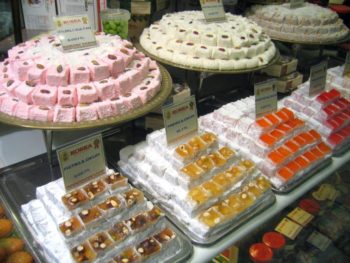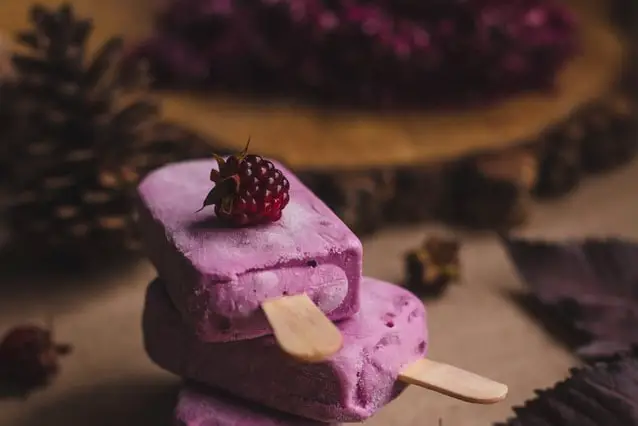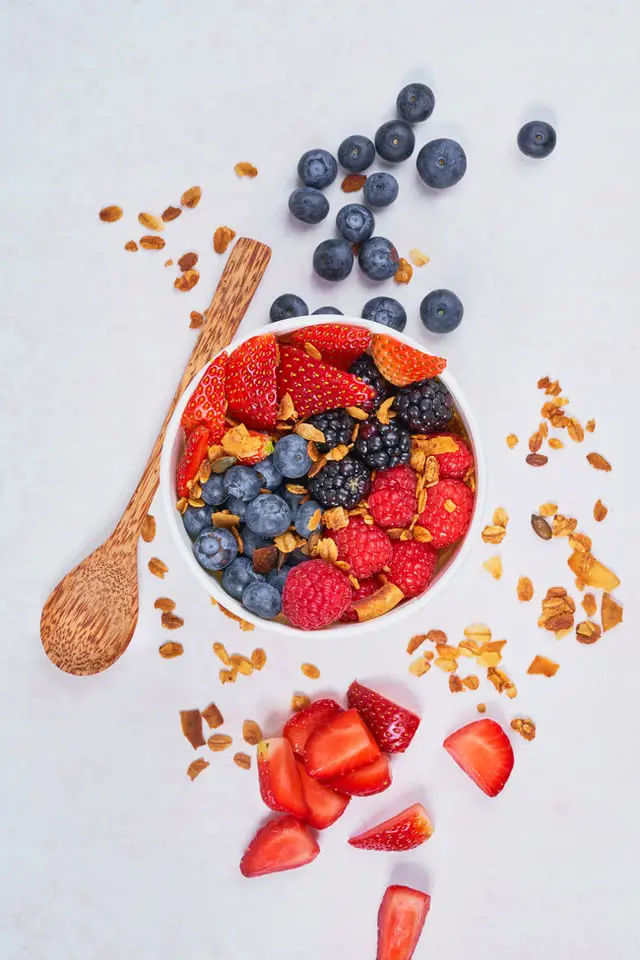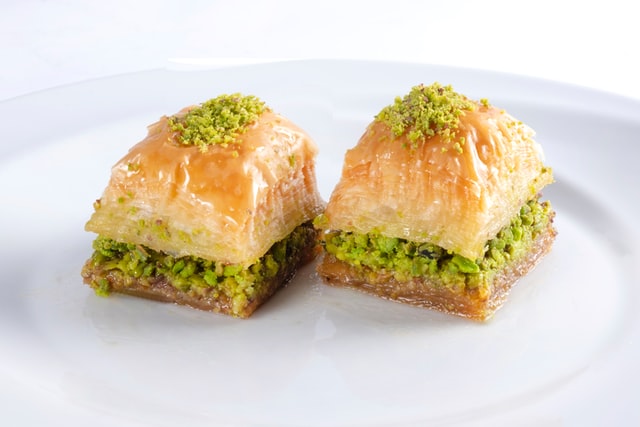Is Turkish delight healthy?
Since my last summer trip to Istanbul, I have been wondering if I could ever find a place that sells similar cuisines like baklava and Turkish delights. I never find a similar magic taste since then. Now, I am wondering again if these were as healthy as they taste.
The answer is different according to your situation. Eating reasonable quantities of Turkish delight, no more than 6 cubes per day is not harmful for most people. For diabetic people is not preferred, and for people allergic to some of its components, it is forbidden.
Details regarding other conditions will follow.
History
Many know of Turkish Delight (or Lokum as known in Turkey) from the movie “The Chronicles of Narnia”, where Edmund betrayed his three brothers for few pieces of Turkish delights.


Many others thinks it is an old Turkish dessert that is kept in luxurious boxes and Turks are addicted to it. However, it seems not to be either.
These cuisines (or better to say, their ancestors) were known long before the Turks re-created it in the present shape. The old “Abhisa”, was a dessert known by Sasanians who lived in Iran more than 500 years BC is thought to be the origin of Turkish delights.
However, Turkish historians have other opinions. They believe that a Turkish Sultan wanted to impress his wife and so asked his chefs to create a new cuisine. They, in turn, made a competition and one of them presented Turkish delight to the Sultan who, himself, was so impressed.
The most accepted theory worldwide is that it was the invention of a confectioner named Bekir Effendi, an Anatolian citizen, who opened his sweet shop in Istanbul in 1776. He used flour with sugar, honey or molasses to prepare the first forms of Turkish delight, and the ottoman Sultan liked it so much to simply consider it a royal dessert. Later on, Bekir Effendi replaced flour with cornstarch, which remains as the tradition since then.
More than 50 years later, a British traveler took some pieces of Turkish delight with him to England. From that point, it started to take its place as an international cuisine.
Turkish delight ingredients and How is it made?
The earliest known recipes by Bekir Effendi were using flour and honey and molasses. After the introducing of corn flour by the mid of the 19th century, it replaced flour. Later on, as mass production started, fruit syrup, refined sugar and other food colors and flavors. Additives now include citric acid, tartaric acid or even potassium bitartrate.
There are more than 40 types of Turkish delight and this fact dictates the addition of other ingredients. Nuts in different types as pistachio, walnuts, or hazelnuts. Flavors as mastic, rosewater, lemon, orange, mint, pomegranate, ginger, clove, saffron, chocolate, coconut or bergamot oil.
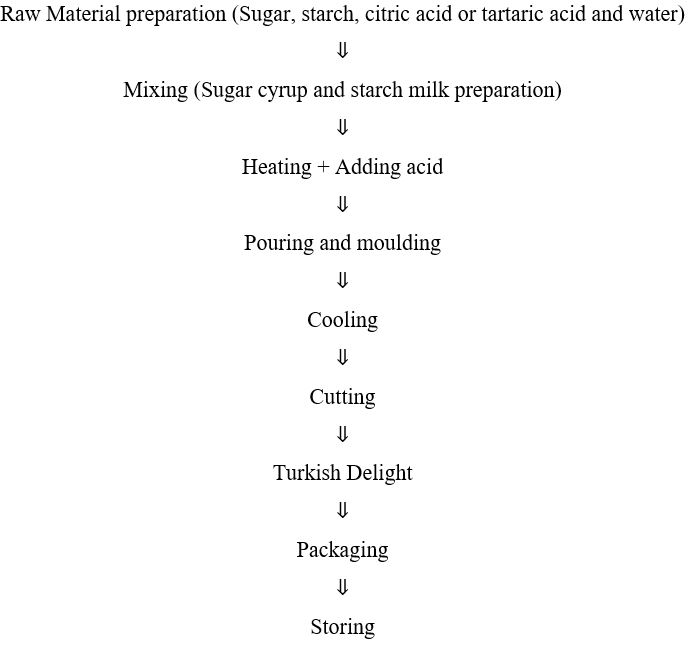
Some types contain milk products like Afyon creamed delights. Some European countries add gelatin to the recipe, however, this is not the case in Turkey.
Turkish delight nutritional facts
As with any manufactured food stuff, we must consider many aspects. First of all the ingredients of the common recipe, the alterations made to the recipe by adding more components and finally additives, preservatives, or flavors added.
Since in Turkish delight we have tens of types, it can be very difficult to enlist all the facts related to all types. Alternatively, we will only describe the nutritional facts of the plain type and the commonest additions like nuts.
Nutritional facts for 1 serving (12 gms, one inch cube of Turkish delight with hazelnut and pistachio):
- Calories: 33 Kcal ( around 2% of daily recommended intake DRI)
- Total Fat 1gram: 2% of DRI.
- Saturated Fat 0.2 grams: 1% of DRI2%
- Total Carbohydrates 6.1 grams: 2% of DRI
- Dietary fiber 0.1 grams: 1% of DRI
- Sugar 4 grams
- Zinc 0.28 mg: 3% of DRI.
- No cholesterol. (if mild is used, as in Afyon creamed delights, there will be minimal quantity).
- Others are on negligible quantities (proteins, potassium sodium,..).
If you prefer to use exercise to burn a piece (1 inch cube) of Turkish delight, you need 9 minutes of walking (3 mph), 3minutes of running (6 mph), or 5 minutes of bicycling (10 mph). of course this only helps to abolish the effect of caloric intake but will not help with excessive intake of nutrients such as fats or minerals.
Definite harms
- Preservatives and additives. Citric acid in the quantities present in Turkish delight is harmless. However, excessive intake may cause gastric upset and affects teeth.
- Some components may cause allergic reaction in a susceptible person such as nuts or milk products.
- Tooth cavities: due to excessive eating of sweets over long time.
Is it good for a healthy person?
At first, Turkish delight was called “rahat-ul hulküm” which means “throat comfort” as it has soothing effect on painful throats. However, there is no scientific basis of being beneficial for treating inflammation of the throat.
There is no need to avoid eating Turkish delight in reasonable quantities for a healthy person. Being considered as a snack, it’s better not to exceed 200 Kcal per day, which means around six cubes of Turkish delights.
Of course, the best practice is to “make it yourself”, however difficult, or purchase it from a reliable shop with no added colors or additives. Also check the expiry date.
I have diabetes. Can I eat Turkish delight?
In fact, Turkish delight is a high-sugar, low-nutrition food. In diabetes, refined sugar are even more better to avoid than in non-diabetics. It surely will elevate your blood sugar acutely and are not of any proven nutritional value. Try to stay away from it.
However, as doctors, we allow some “rule-breaking” for our patients every now and then. I would never allow more than one cube for my patients infrequently.
Even though there are some “diabetic Turkish delights”, they are claimed to contain some polyols (naturally occurring food sweeteners, found in some fruits and mushrooms) and although approved by many authorities like FDA, some still don’t prefer to eat them. I prefer eating normal Turkish delights but in minimal amounts as said before.
Is Turkish delight vegan?
Most types are. However, you will have to check the ingredients since some types, like “Afyon creamed” are not vegan.
Is Turkish delight fattening?
Although the caloric content of the maximum allowed intake of Turkish delights is not a big problem, the main culprit is that it stimulates more hunger and so, many cannot simply comply with this dietary recommendation.
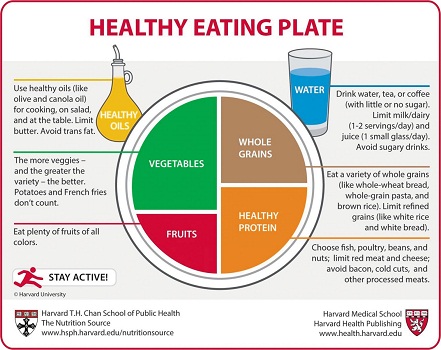
For this particular reason, you should not eat sweet food at the beginning of any meal since this will increase your appetite and makes it difficult to stick to your dietary plan.
Is Turkish delight gluten-free?
Yes, nearly all Turkish delight recipes are gluten free. Please check the ingredients of the package.

